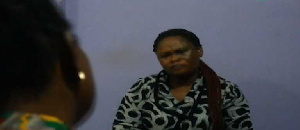Health News of Thursday, 15 February 2024
Source: 3news
Cervical cancer survivor advocates for increased awareness and support amid rising cases
Receiving a cervical cancer diagnosis is undoubtedly a daunting experience for any woman, and the story becomes more poignant when the battle costs not only health but also the loss of the womb.
Rita, a pseudonymous 48-year-old cervical cancer survivor, who, despite her harrowing journey, radiates health and optimism.
In 2019, Rita confronted the diagnosis after six months of persistent bleeding, a silent indicator of the internal turmoil. "It wasn't easy. Huge clots of blood would just be falling off. After all tests, I was informed I had cervical cancer, but what helped me was that it was at stage one," she shared in an interview on TV3.
The emotional toll was not the sole price; Rita had to sacrifice her womb for the treatment. The financial cost was substantial, with approximately GHC30,000 spent on surgery alone. Rita's story sheds light on the multifaceted challenges faced by cervical cancer survivors, including societal stigma.
Dealing not only with the illness but also community judgment, Rita faced stigma even within her church community, compelling her to cease attending services. Her account reflects the need for increased awareness and support for those navigating the complexities of cervical cancer survivorship.
The 2022 World Health Organisation (WHO) global cancer observatory report identifies cervical Uteri cancer as the most common cancer among women. In Ghana, it ranks as the third leading cause of death, claiming nearly two thousand lives annually. For women living with HIV, the stakes are higher, necessitating regular screenings to enhance their chances of survival.
Despite the urgency for effective strategies, Ghana grapples with limited success due to insufficient data and a lack of clear policy direction. Dr. Ayisi Addo, the Programmes Manager for the National Aids Control Program, stresses the need to track advanced cases of HIV diseases, such as cervical cancer, through systematic approaches.
The cost of Pap smear screening, a crucial diagnostic tool, varies across facilities and is not covered by the National Health Insurance Scheme (NHIS). Currently lacking a national program for cervical cancer screening, Ghana faces the imperative to initiate discussions for comprehensive preventive measures.
Dr. Chris Fofie, Deputy Director in charge of family planning at the Ghana Health Service, underscores the need for a national program to address the low number of women screened for cervical cancer.
Additionally, the I-CERV-GH project, led by the Noguchi Memorial Institute and the government, seeks to integrate cervical cancer screening into routine care for those living with HIV. Professor George Boateng-Kyei, the principal investigator for I-CERV-GH, emphasizes the importance of prioritizing issues affecting women living with HIV.
According to WHO, nearly 500,000 new cervical cancer cases are recorded globally each year, with 80% occurring in developing countries. Rita's journey and the struggles of women with cervical cancer underscore the urgency of proactive measures and comprehensive support systems.
Entertainment










